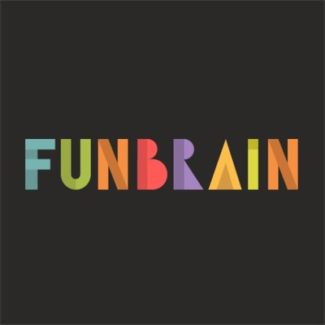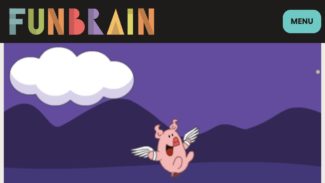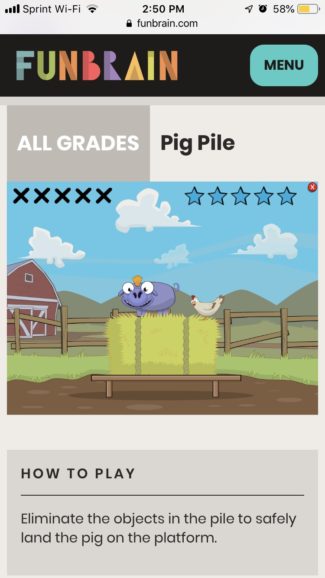Bastion
LQ: 9.15
Recommended Age: 10+
Skills Used: Planning, Working Memory, Mathematics, Reading

Funbrain is an educational website that focuses on making learning fun. There are games, videos, and books to read, as well as a playground (for younger children) and a math zone. The user can search by activity (game, video, or book) or grade (Pre-K through 8th grade). The player accesses and plays the game via the website, which is easy to navigate and use.
Each category (game, video, book) has dozens of options available, ensuring that children will be able to find something that they like. It also means that, for parents who take the time to try things out themselves, it will be possible to find a game to help their child with any thinking skill they may want to focus on.
While this website does not have an ESRB rating, Funbrain provides a fun, safe, and educational website. They do not collect personal information from the children and the content is appropriate for a wide variety of ages. Lw4K recommends this as appropriate for any age. Children will, however, need adult help or the ability to use a computer in order to engage with this website.
Funbrain helps kids practice and improve the following skills:
Funbrain has games--both in the game section and sorted into an entire "mathzone"--that focus on math skills. Addition, subtraction, multiplication, division, shapes, and fractions, to name just a few. Each game is rated for what grade levels it covers. Various math games can also work executive thinking skills, such as Tic Tac Toe Squares. In this game, the player would use math skills to answer the math problems, planning skills to decide where to place their X, and even focus and working memory skills to help remember the answers to the math problems and where they want to go next.
Just like for math, Funbrain has a reading section. In this section there are a number of books and book samples, covering a variety of genres and age ranges. To make the most of this, reading should be done with both a parent and a child. This way the parent can help encourage fluency and pronunciation, answer any questions, and help make connections and verify comprehension.
Funbrain also has games that work with subsets of literacy and reading skills. Games like Grammar Gorillas, Word Turtle, The Plural Girls, and Grammar Bees, can all help when it comes time to practice reading and reading comprehension.
*With the wide variety of games available on Funbrain, it is impossible to list them all here. The best way for a parent to find a game to work on a specific thinking skill is to try them out. However, we have listed below all of the thinking skills and what you should look for in a game that practices those skills.
 Flexibility
FlexibilityAdapting and adjusting to changing conditions and expectations.
Flexibility requires a player to try new things and adjust to different obstacles. Games that work this skill will ask players to try more than one way to solve a problem or provide two or more different types of obstacles for the player to avoid.
Getting started and then maintaining attention and effort to tasks.
Focus skills include everything from getting started right away, ignoring internal or external distraction, and maintaining focus on short-term or long-term goals. The majority of the games on Funbrain all seem to require five correct answers, meaning those games are going to practice short-term focus. If you also want to practice initiating a task or ignoring distractions, the best games will include either a time limit or movement, or both. In those instances, a player who doesn't get started and keep their attention fully on the game will mess-up and fail to meet the completion goals.
Arranging and coordinating materials in order to complete a task.
Organizational skills are best practiced with games that require the player to place numbers or objects in a specific place or order according to specific rules. Funbrain games like Sudoku and Shape Invasion are great examples of this.

Developing a systematic approach for setting and achieving goals.
Planning can occur in any game where the player needs to think about their move before they do it. Sudoku and Tic Tac Toe Squares, where the player has to identify several moves ahead of their current turn, are great examples of planning practice. Pig Pile, where the player has to think about how removing an item will impact the whole pile, also provides planning practice.
Understanding our own actions, thoughts and feelings.
Self-awareness games are less common. They require the player to have to think about character surroundings or health. Any game with a health meter or that requires a player to avoid obstacles in the environment can work the same "muscles" that self-awareness thinking skills use.
Managing our actions, thoughts, and feelings.
Self-control is a skill that can be practiced on any game that frustrates or excites the player. If you find a game that you think your child would enjoy, but be challenged by, it is the perfect opportunity to practice anger and frustration management. A game that requires quick reaction time and causes the player's "engine" to run high also provides self-control practice. Either way, you know your child best. If it's a game that will challenge them it is probably a game that will provide them with self-control practice.
Being efficient and aware of our use of time and effort.
Time management games can be easy to spot. Any game that has a time limit element will require the player to exercise time management skills. Less obvious are the games like Log Run, which require the player to keep pace with moving obstacles.
Recalling and retaining information in our minds while working.
Any game that requires the player to remember new information or (like math games) recall previously known facts is a game that allows the player to practice working memory skills. You can also look for games that require the player to follow more than one set of directions. That sort of following a list of directions will also exercise the player's working memory skills.
All membership plans come with full access to our entire suite of tools learning guides, and resources. Here are a few of the ones we think you’ll like the most: